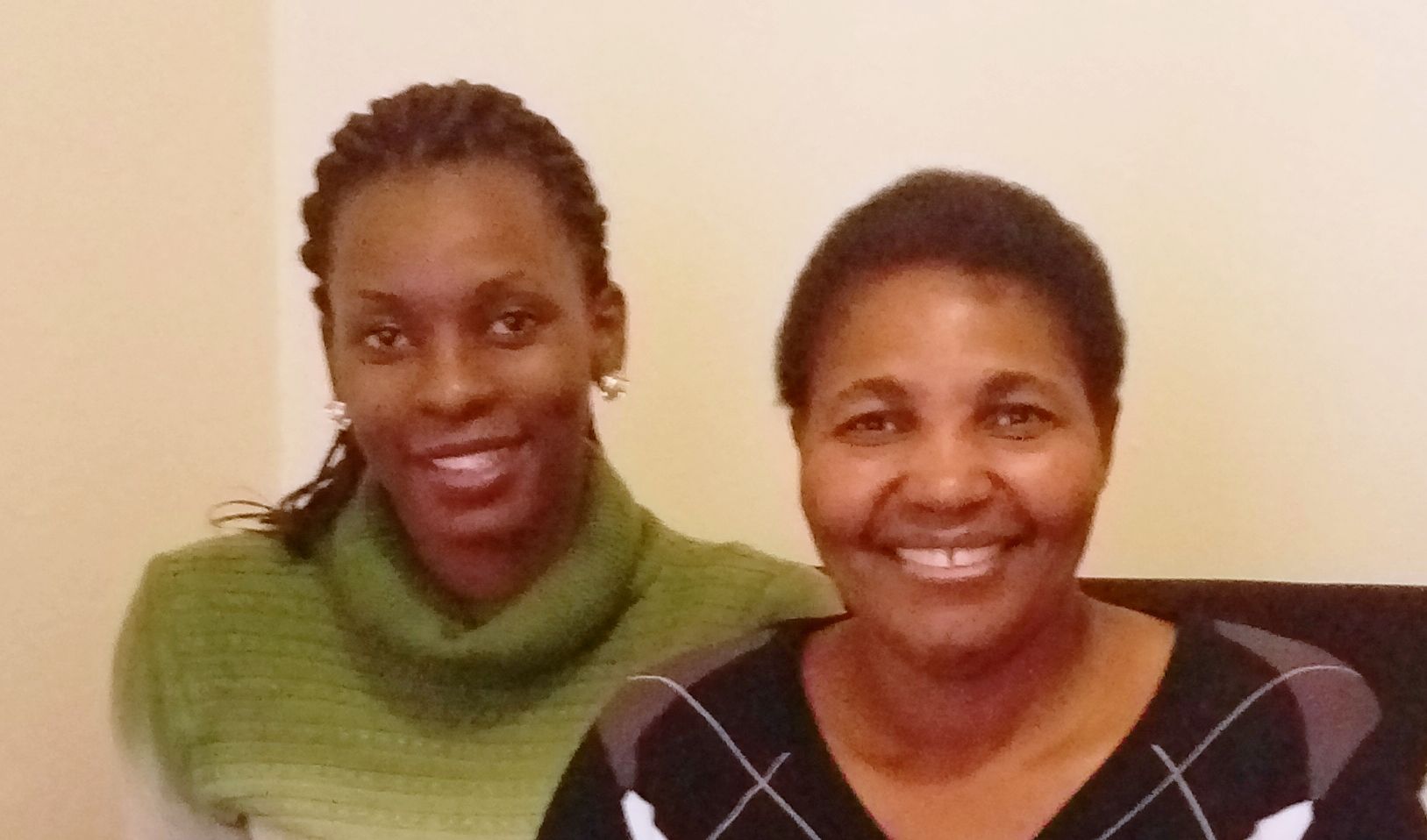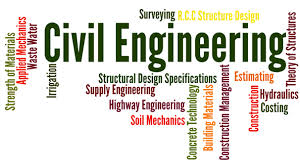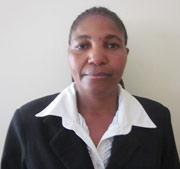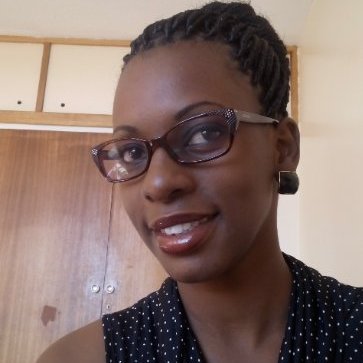Meet our East African Civil Engineers, Catherine Githuku is a lecturer at the Kenyatta University, Kenya and Agustina Alexander is a lecturer at the University of Dar es Salaam, Tanzania.
Question: How would you describe yourself as a civil engineer?
Catherine: I am a lecturer in civil engineering. I enjoy training especially in the areas of structures(design of buildings, foundations and similar structures). I have also specialized in structures around water-ways(that is dams and intakes).
Agustina: I am a consultant. I work on projects in the area of water services.

Question: Your Background?
Agustina: I have worked as a water services engineer for 8 years, majorly in hydrology which is the water on the surface of the earth such as rivers, lakes and precipitation and ground water, which involves citing groundwater and arranging for drilling. I have also done a few projects in waste water management.
Catherine: My first job was in the Ministry of Water, after which I went into teaching in the Kenya Water Institute. This portion was focused on the structures revolving around water, that is, design of dams and intakes etc. I have also analyzed waste water as part of my masters research at JKUAT, to determine the presence of heavy metals in crops grown using raw sewage in Dandora, Kenya. Currently, my Ph.D research is focused on waste water from the mines and how to clean the heavy metals from the mine water.
Question: Why did you do civil engineering and why are you still doing it?
Agustina: I didn’t want to do civil engineering but preferred chemical engineering. There was a government project in Tanzania where all girls who passed their high school exams were given a chance for early registration into the university for engineering courses only. After completing high school, I applied and was selected to join civil engineering. I applied for course transfer and even got accepted into telecommunication engineering but the civil engineering professor refused to let me go. As I went further into the course, I could see the impact of everything that I was taught. In the area of water, specifically, I was able to identify the challenges of water in Tanzania and what I could do as I civil engineer. The value of your work is visible. That is why I keep doing it.
Catherine: Mine is a story about buildings and water. At our home, my mother made a proper and stable dish rack, next to the house, out of timber. My attempts to make a similar one failed, despite placing the sticks in the same way. This was of great interest to me, how to some structures stay stable and others fall. I would also wonder about why we had to fetch water from the river instead of it coming straight to our home? My interest grew in school as I studied subjects like physics which talked about forces, motion and stability. I also had a chance to find out how physics branches out into mechanical, civil and electrical engineering. Physics and maths are still a passion of mine. Why am I still doing civil? Civil engineering is all I have ever wanted to do. I really want to do a lot more than I have done. I ventured into teaching and I want to do it well. One of our professors in university cautioned us to consider the lives lost when a structure(building or bridge) collapses. I told myself that ‘If I am going to work in the field, I must be the best. If I am going to train, I must train people who are going to become the best even in integrity.’ Teaching gives me a platform to encourage my students to go further than I did in their careers and advice on issues affecting us such as corruption. I make sure my job is not shoddy and above par, whether in the field or in teaching. This is why I am still here.
Question: Family and Work, how do you juggle the two?
Catherine: I was engaged in a graduate training program in the Ministry of Water on completing university, which involved moving from one ministry to another, eventually ending in promotion to district engineer. The program required field work in different districts to expose me to dam design and construction. My spouse was unwilling to let me go, so I, then, opted to take a position in teaching. For women, family issues greatly affect our careers. Looking back, I could have opted otherwise, but because I loved teaching, it was not a hard decision. I still would have liked to have more field experience. I think there is always a way out for women to handle work and family. Families will always find a way to work in harmony.
Agustina: After university, I interviewed with a multinational and got to speak to one of the female recruiters. Concerning family, she explained how involving the job was in terms of career growth, which translated to limited time for family or relationships. I grabbed the chance to teach at the university in order to have a family and the stability that it requires. It is a challenge for a woman to have a family and go out to the field. I remember before I got married, I was very involved in research and field work and enjoyed it. When family came, I put everything else aside. My career practice and field expertise suffered as my focus shifted to family. Projects would involve being away from the family for prolonged periods of time. I have found that it is really a difficult balance family and career. I am also fortunate to have a spouse who supports me.
Question: Would you consider going back to the field when the kids are older?
Catherine: My teaching job was suitable for raising my family, especially since one of my children is autistic. I have been toying with the idea of going back to the field now that my children are grown. Going back would mean starting from scratch, that is, being attached to a consulting company and learning the new designs and supervision.
Agustina: My university has a consultancy bureau where I have done a few projects, so I will definitely go back to the field.
Question: Any other challenges that you have faced as a woman engineer and what have you done about them?
Agustina: When I started working in the consultancy at the university, I was working as an intern under the professor. When he retired, he left all his projects to me. I was scared because I was young and inexperienced. The first project I did was waste water management at the Nelson Mandela Institute in Arusha. I really struggled with this project due to my lack of prior experience. It was the first waste water management project that I had done in a large institution. The overall project manager tried to push for reduction of the waste water budget by changing the design to cheaper septic tanks. I had to convince him(a civil engineer) that it would have additional running costs compared to my original design. It seemed like a test, which could have ended negatively for me. The project worked out well and continues to run successfully. The second challenge is that of registration with the Engineers Board. Despite the support in getting the required experience in Tanzania, engineers in teaching are not considered for registration. The registration is focused on the field, meaning design and management of the project. They also do not recognize hydrology or water services engineers, hence your experience should include structures. For these reasons, I have been unable to register. In the meantime, I would have to work with a consultancy firm and send in the required reports.
Catherine: We still have similar problems with registration of Engineers in Kenya. The problems of registration are real and they may affect women due to the restrictions, such as not being able to be in the field due to family. Even men who venture into teaching have projects aside and have something to present for registration. I wouldn’t have time to go to site if I have to teach, pick children etc. This is where the effect on women would be more in terms of getting more projects for registration. It is good that we have women engineers in these Boards now and they understand these challenges and advocate for us.
Question: How would you define success?
Catherine: You keep redefining success. I look at my students and where they are and I define this as success. One of my former colleagues at the Ministry referred me to a group of students for mentorship saying that I motivated her to pass her diploma and undergraduate degree, ‘making her the woman that she is in her career as an engineer.’ She was promoted to the District Engineer once she completed her studies. This feels good. I am succesful when I see my students shine wherever they are. I have been able to bring up my family, this is success to me. I may not have reached the apex of my career but I am satisfied. Success is all round, not just career.
Agustina: Every time I visit Nelson Mandela Institute, I am like ‘Wow! That is Me’. It feels good. I have been the project coordinator in my department, which means dealing with students who do not work and complains about you trying to fail them. They did not understand that I assigned supervisors randomly and that these supervisors assigned marks. They would quarrel with me but at the end of the day, I became their friend to the extent that they could seek advice from me on other issues. This is another thing that has made me feel successful.
 Question: Christine, you were head of department of Civil Engineering at Kenyatta University. What was the best thing about being the Head of Department?
Question: Christine, you were head of department of Civil Engineering at Kenyatta University. What was the best thing about being the Head of Department?
Catherine: I really enjoyed it and the best part was finding a department that was not motivated and getting it working again. On being appointed, there was a lot of push and pull, and discontent from others on my appointment. But eventually, we became friends and I was able to have a cohesive department which worked. I even got a Vice Chancellors’ Award for having done well. I discovered that I like being in charge and making things work. Another good thing was being assigned a job that is not in your job description because you get things done. I was the team coordinator for the development of Petroleum and Aaerospace engineering courses, where I was volunteered by the Dean and the Vice Chancellor respectively. Presenting to stakeholders and answering questions in areas that were not my specialty made me realize my capacity. This is success.
Question: Worst bit about being Head of Department?
Catherine: Dealing with people who feeling you are not qualified, using the phrase ‘This woman’. On my appointment as Head of Department in 2012, the first questions were “Why you? Will you really manage?” There was a lot of resistance but God gave me grace. By the end of my term, we had restructured the department according to the Engineers Act and changed the curriculum, despite discontent and murmurs. This was not easy. Another challenge was incitement of the students by the lecturers during that charged period, where accreditation of courses was an issue. I realized this and was able to handle students issues with a level head. My students were responsive to the conversation and there was no unrest in my department. In the long run, those who were against me have put aside the differences they had with me.
Question: What work ethic have you learnt over the years?
Agustina: I was the youngest staff in my department, which meant getting all the tasks whichwere ‘unimportant’. I did all the alloted tasks, did not take it negatively and the Head of Department trusted me for this reason. Eventually whenever I needed help from the department, I always received it. Some things may appear negative but they are there to teach you. It is important to build such trust. The head of department also tasked me with handling finance at a WaterNet conference. This was impromptu since I was handling another docket in the conference. This meant handling large sums of money in different currencies. The conference was successful. When I asked him why, he said that he trusted me to handle things that required urgency and was proved right by the success of the conference. Doing all my tasks well paid off. I learnt that it is important to take time to build trust and in the meantime, perform tasks diligently.
Catherine: Unless you take up some of these jobs, you won’t know whether you are capable. A positive attitude is very important. Negativity means that no one gives you opportunities. I was given the opportunity to be the acting principal at The Water Institute. Despite my doubts about whether I was suitable, I took the position. I learnt so much about myself. For example, I am an independent thinker and do not just follow instructions if they are against my principles. There was some friction with my boss because of this but he eventually learnt to trust my judgement. At one point, I was both acting principal and deputy principal and was able to follow up on promotion of some staff through personal initiative. These fellows were finally promoted and I discovered that this was what leadership was all about. So it is good to take up some of these positions and not be negative. When you are negative, you get agitated. How you deal with people really matters.
Question: Have you been involved in any mentorship program?
Agustina: Currently as female academic staff in our college, we are launching a program where we visit girls in high schools to encourage them into science and engineering. Apart from that, I have also talked to girls in high school before. I received an award as the best female graduate in engineering from the Ministry of Science. So we would talk to young girls to encourage them as the best students. I also got the Engineers Registration Board award for best student in water and civil engineering. After this award, we also went to a lot of schools talking to them about engineering and what it takes.
Catherine: I have only mentored girls in my old school. I talk to them about what engineering is, how it is to be a lady engineer. When girls visit the University from high schools, I am called to talk to them but I have never been in any formal mentorship programs.
Question: What next ?
Agustina: There are very few specialists in groundwater in Tanzania. I want to work in groundwater and make it a resource for the arid areas where there are no rivers. Specifically, how do we make use of groundwater sustainably so that we do not abstract and have nothing left. My department has been involved in quite a lot of projects that are groundwater related from the government. So I would also like to help them build capacity in groundwater so that they can further engage in groundwater activities.
Catherine: My mum used to tell me “What is yours will finally come to you.” I believe that no one will take your position if God is for you. Since I was almost completing my tenure as the HoD, I think the next step for me would be Deanship. We are also thinking about how to increase the research capability in our department with one of my colleagues. We had received a whole laboratory and equipment in our department and this will help greatly. Though I do not dream big immediately, I believe that I am able to handle challenges that come my way. If there is a chance that I can get there, then I will get there.
 Catherine Githuku is a lecturer in civil engineering working in the Department of Water and Civil Engineering at the Kenyatta University, Nairobi, Kenya. She started her teaching career at the Kenya Water Institute, where she worked for 23 years. She has also worked as an assistant engineer with the Ministry of Water Resources in the Planning and Design Section. She is currently undertaking her Doctorate in Civil Engineering at Tshwane University of Technology in Pretoria, South Africa.
Catherine Githuku is a lecturer in civil engineering working in the Department of Water and Civil Engineering at the Kenyatta University, Nairobi, Kenya. She started her teaching career at the Kenya Water Institute, where she worked for 23 years. She has also worked as an assistant engineer with the Ministry of Water Resources in the Planning and Design Section. She is currently undertaking her Doctorate in Civil Engineering at Tshwane University of Technology in Pretoria, South Africa.
 Agustina Alexander is an assistant lecturer at the University of Dar es Salaam in the College of Engineering and Technology. She continues to work at the Bureau for Industrial Cooperation (BICO) within the University of Dar es Salaam as a water services engineer. Her interests are in water technologies specifically groundwater and hydrology. She is currently a research fellow at Tshwane University of Technology, Pretoria, South Africa.
Agustina Alexander is an assistant lecturer at the University of Dar es Salaam in the College of Engineering and Technology. She continues to work at the Bureau for Industrial Cooperation (BICO) within the University of Dar es Salaam as a water services engineer. Her interests are in water technologies specifically groundwater and hydrology. She is currently a research fellow at Tshwane University of Technology, Pretoria, South Africa.



Wow that’s so encouraging, “what is yours will finally come to you” that’s awesome. I’m 19 a second year student at Jomo kenyatta University studying civil engineering. Winnie is my name. Being female in such a tough course has challenges, but being young makes me more determined to come out successful. I wanted to be a pilot but due to poverty, I’m here now. I will take the challenge and make it work, I believe that this is destiny calling. It’s good to know that there are ladies who have made it in this field.
Keep going, Winnie! The road gets tough but you are able and capable. And we are always here to encourage you when you need it!
Am very happy of you…. Am also a civil engineering student in kenya
am so inspired by these great ladies. thanks for sharing your stories about taking engineering as a career. my name is Naomi am doing civil engineering at Belgorod State Technology University in Russia and am looking forward to becoming the best engineer in my field.
am so inspired by their stories so happy for u Catherine and Augustine. am also doing civil engineering at Belgorod State Technological University in Russia .looking forward to become the best in my field.